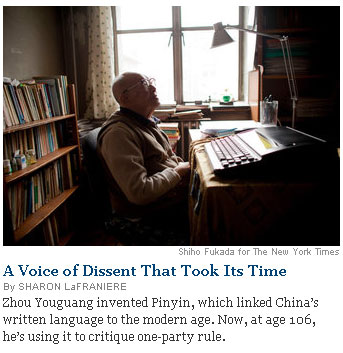The New York Times has just published a profile of Zhou Youguang, who is often called “the father of Pinyin” (though he modestly prefers to stress that others worked with him): A Chinese Voice of Dissent That Took Its Time.
This profile focuses not only on Zhou’s role in the creation of Hanyu Pinyin but also on his political views, which he has become increasingly public with.
About Mao, he said in an interview: “I deny he did any good.” About the 1989 Tiananmen Square massacre: “I am sure one day justice will be done.” About popular support for the Communist Party: “The people have no freedom to express themselves, so we cannot know.”
As for fostering creativity in the Communist system, Mr. Zhou had this to say, in a 2010 book of essays: “Inventions are flowers that grow out of the soil of freedom. Innovation and invention don’t grow out of the government’s orders.”
No sooner had the first batch of copies been printed than the book was banned in China.
Although the reporter’s assertion, following the PRC’s official figures, that “China all but stamp[ed] out illiteracy” is well wide of the mark, there is no denying Pinyin’s crucial role in this area. I recommend reading the whole article.


He is now 106 years old!
Someone at the NYT changed the caption to “Zhou Youguang, 106, invented Pinyin, a spelling system that links China’s ancient written language to the modern age, and he’s using it to speak his mind,” which is decidedly worse.
Same Mistake on Paragraph 3…
“Mr. Zhou is the inventor of Pinyin, the Romanized spelling system that linked China’s ancient written language to the modern age and helped China all but stamp out illiteracy.”